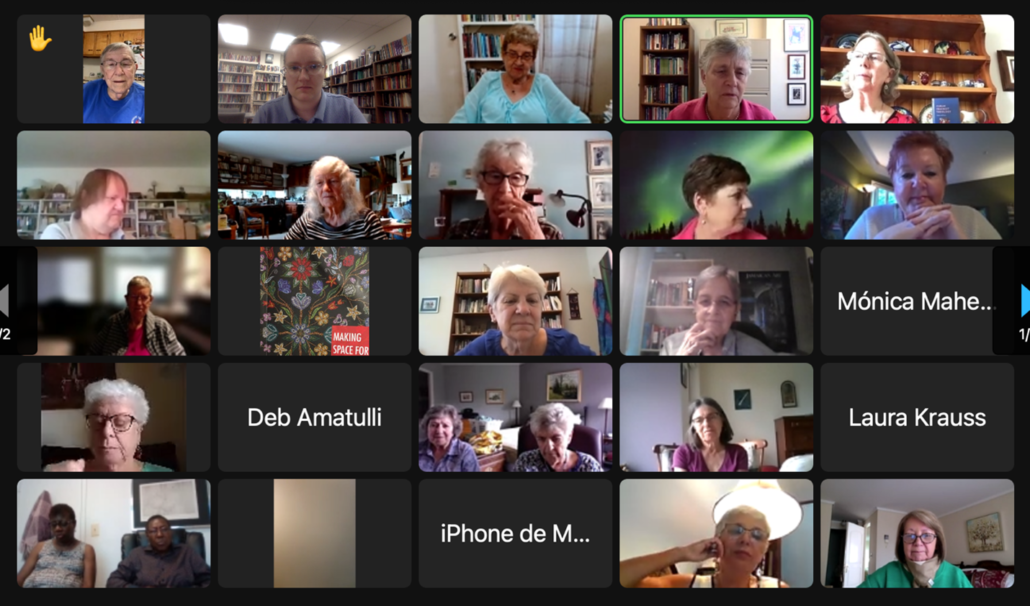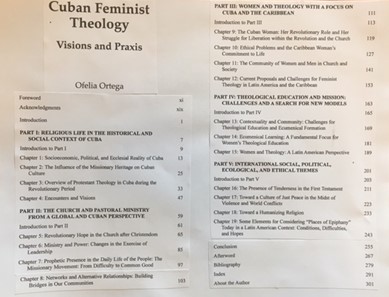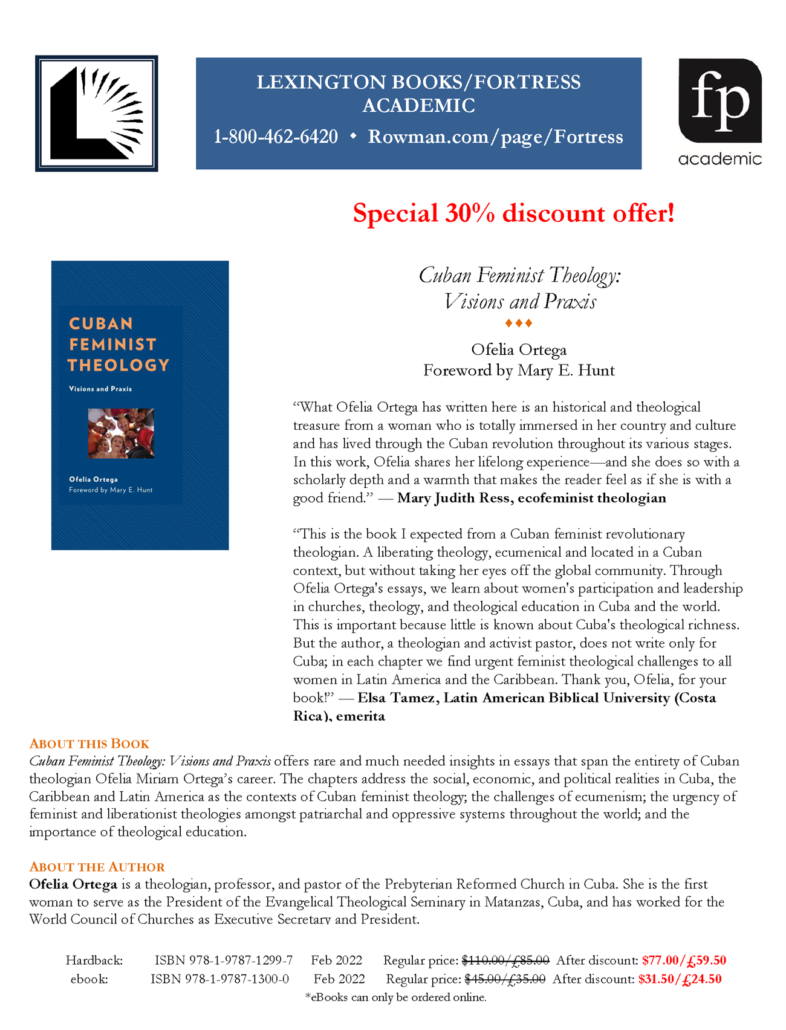“Cuban Feminist Theology: Visions and Praxis”
with Ofelia Ortega, Shannon Clarkson, Cherie White, and Mary E. Hunt
Wednesday, September 14, 2022, 1 pm EDT
Video recording available here.
WATER is deeply grateful to Ofelia Ortega, Shannon Clarkson, Cherie White, and Mary E. Hunt for their contributions.
These notes are meant as highlights of the session, not a verbatim of the event.
Mary E. Hunt:
Buenos tardes. Bienvenidos. Good afternoon. Welcome.
I am Mary E. Hunt, co-director of the Women’s Alliance for Theology, Ethics, and Ritual. I am in the WATER office in Silver Spring, MD in the United States with the other co-director, Diann Neu, and our staff colleague, JT Rustad. We greet you for the first of our fall 2022 WATERtalks, and who better than Ofelia Ortega to lead us!
Welcome to all of you, especially those who are new to WATER. A special welcome to our dear sister Ofelia, and to the colleagues in Cuba and others from Latin America who are with us through the miracle of the Internet.
I begin with a land acknowledgement hoping you will think about the land upon which you sit: We at WATER are on indigenous land in Silver Spring, Maryland, the traditional and contemporary land of the Piscataway and Anacostan peoples. We acknowledge the trauma that is deeply imbedded in the foundation of this country and commit to eradicating such injustice.
WATER’s work brings feminist/womanist spiritual values to efforts at social change. Earlier this year we heard from Professor Lisa Allen who spoke about A Womanist Theology of Worship: Liturgy, Justice and Communal Righteousness. Professor Jennifer Harvey spoke about her book, Raising White Kids: Bringing Up Children in Racially Unjust America.
Now we turn to Cuba for Ofelia Ortega’s wisdom. Her book, Cuban Feminist Theology: Visions and Praxis, is an important new publication of many of her works in English. As a scholar, pastor, international and national activist, and more, Ofelia brings biblically based insights in accessible essays to a wide audience. We are part of that audience today.
Background:
- Shannon Clarkson is an educator, an ordained UCC minister, an activist and a scholar. She collaborated with her life partner renowned feminist theologian Letty Russell on many projects including The International Feminist Doctor of Ministry Program at San Francisco Theological Seminary. Shannon, please tell us something about that wonderful program and how it empowered so many women all over the world to advance in their careers.
Shannon Clarkson and Letty M. Russell started the D.Min program in 1993. It effectively ended in 2007 when Letty died, although students continue to finish their dissertations and graduate to this day.
There were not many D.Min. programs for women in the U.S. They founded this program for international women with an emphasis on women from developing countries to prepare them for church leadership and teaching. Cohorts of students met in January for 2 weeks in Geneva, Switzerland, and another 2 weeks in a country in the Global South, for example, Ghana and Cuba. Then they took classes for six weeks at San Francisco Theological Seminary in San Anselmo, CA for each of two summers. They studied, did research, and worked in their ministry as part of this program.
Letty and Shannon helped find scholarship money for international students, assisted by the World Council of Churches and other international organizations. U.S. women had to find their own funding. Groups were made up of women from a variety of countries.
At least seven students have published books that were originally their dissertations.
- Cherie White is a retired United Methodist Church mission personnel who served in Chile & Mexico teaching at the Methodist Seminary in Mexico City for 23 years. She spent much of her childhood in Cuba where her late father, David C. White, was a professor at the Seminario Evangelico de Teologia in She has known Ofelia since she was 12! Cherie is also a graduate of The International Feminist DMin Program and was honored to be Ofelia’s thesis advisor. She is a bilingual editor extraordinaire and tireless colleague in justice struggles. Cherie, please give us your view of the structure and content of this volume.
- The book basically is Ofelia Ortega’s D.Min. dissertation which was turned in to SFTS in 2018 and allowed her to graduate in 2019.
- This book, therefore, also has new material, due to its 2022 publication date. That is 1) a “right-on” Foreword by Mary E. Hunt and 2) important Cuban issues related to how the country and the SET responded to the pandemic, among other information about other church related issues or events which took place after 2018.
- The book has 5 parts which reflect 5 different subject matters (see Contents).
- Each part has 3-4 published & unpublished articles for a total of 19 that Ofelia has written over her career as a seminary professor, theological consultant for the World Council of Churches, and above all, as an ordained Presbyterian minister.
- Her main interests, which intersect all her articles are:1. Theology: Feminist, Liberation, Latin American.2. Theological education: These theological foci are all evident in her teaching at the SET (Evangelical Theological Seminary) in Matanzas, Cuba, and at the Ecumenical Institute at Bossey, Switzerland (World Council of Churches related) and a multitude of conferences and workshops at international, Cuban national and local church levels.3. Ecumenicity: Her ecumenical & inter-religious outreach is evident throughout the book.4. Biblical Studies, which are the basis for her theology and ministry. Be sure and read chapter 15: The Presence of Tenderness in the First Testament.5. Ministry: the lofty academic aspects of her articles all lead to ministry in the local church, thus her feet are firmly grounded where God’s people are, especially in6. Cuba. Her homeland with its history, cultural aspects: secular and religious, which in turn, affirm her grounding as a Latin American, Cuban born woman who is a Feminist Liberation Theologian, Biblical scholar and Protestant minister.
¡V I V A O F E L I A!
- Mary E. Hunt is a U.S. theologian, co-director of the Women’s Alliance for Theology, Ethics, and Ritual (WATER).
Quite by chance, I was a visiting professor at the seminary in Matanzas when the idea of Ofelia finishing her degree came up. Why not? And why not include Debora Garcia, President of the Baptist seminary in Nicaragua, and Marta Palma from Chile who was working with peace and women’s groups in Europe? All of them were well-qualified and needed only the thesis to graduate. Shannon got busy on the logistics as only Shannon can. San Francisco Theological Seminary agreed to have me teach a kind of refresher and updating course to the three, after which they would go about their thesis work.
We spent a memorable time together in Matanzas, after which other students on campus were heard to remark, “We heard so much laughter coming from that classroom. We wonder what they are doing!” We laughed a lot, and we saw feminist theology as a team sport and we were the team.
Along the way during that class, and in many subsequent communications, we worked on their theses. I recall having a stack of Ofelia’s work which we sorted and categorized and discussed. All three are now doctors in ministry.
I was honored to be asked to write the Foreword to this book. Let me quote from it as a way to welcome and introduce the Rev. Dr. Ofelia Ortega:
“I am a woman who dreams and who struggles,” wrote the Reverend Doctor Ofelia Miriam Ortega Suárez in Cuban Feminist Theology. What dreams they are, and what struggles! This English language publication of her work is a rare and welcome volume. It fills in many theological blanks and opens new horizons for Latin American and Caribbean feminist work in religion….
“Ofelia weaves her life story throughout the collection. She never reduces theology to the private realm, but acknowledges that life experience is a major shaping force in imagining and constructing theology and ethics. As a young girl in a poor family in Cardenas, she felt the sting of sexism early. Her value as a female, no matter how able she was nor how hard she worked, was always seen as less than that of males. Yet she dreamed it could be different, and so she made it different for herself and for many others. That legacy unfolds between these covers with academic rigor and social justice intent, plus a twist of poetry….
“Ofelia went on to work at Bossey, later at the World Council of Churches (WCC) in the Programme on Theological Education, and eventually to serve as one of the presidents of the WCC.
“From early on, she was active in the World Student Christian Federation (FUMEC in Spanish), a global incubator for future church leaders. She became the first woman to be ordained in the Presbyterian-Reformed Church in Cuba. If she had been a man, the road would have been strewn with rose petals. As a woman, her path was rocky and uncertain. That she accomplished it at all is notable. But that she has the bandwidth to write about it, as well as to continue to theologize decades later, is no small feat.
“She embraces her people, her land, her era, and her Christian faith with a robust sense of reality and a profound commitment to justice. She is what feminist liberation theology looks like in action. It is a pity that more women theologians, especially in Latin America and the Caribbean, have not been supported and published to round out the regional picture country by country. With notable exceptions like Ivone Gebara, Elsa Tamez, and a few others, Latin American liberation theology remains almost exclusively male….
“The impact of Ofelia’s work is that whole swaths of Cuban and Latin America/Caribbean theological content previously passed over without most scholars realizing it was missing are now visible. Discovering it, learning from it will help other women and marginalized people value and contribute their own unique ways of asking and answering questions of ultimate meaning and value. This theology is the fruit of Ofelia Ortega’s vocation—that which she could do that no one else could do, and if she did not do it, it would not get done in the world. Cuban Feminist Theology exists and endures thanks to her.”
Remarks by the Rev. Dr. Ofelia Ortega:
At 19 years old, she had her first interview to go to seminary. One of the pastors asked her what would happen if she got married during seminary. She asked them if they asked the men that question. She was striving for freedom for women at all levels.
The journey this book represents began in1995 when she enrolled in a D.Min. course at San Francisco Theological Seminary, inspired by Letty M. Russell and Shannon Clarkson. She was unable to finish the dissertation due to her many other ministry obligations. In 2017, however, she was provided the impetus to finish her dissertation with two other theologians from Chile and Nicaragua. It has always helped to work with and accompany others. They had two weeks of intensive and joyful study with Mary E. Hunt in Matanzas, Cuba. Some of the other seminarians wondered, “What kind of theology are they discussing that they are so happy?”
With the guidance of Cherie White, she finished her dissertation, as did her two fellow scholars. Her dissertation has developed into the book Cuban Feminist Theology: Visions and Praxis, which includes aspects of the lives of women in Cuba and the Caribbean and changes that need to be made in pastoral practice to achieve more participatory and less dominating leadership. In addition, the book includes a decolonizing reflection on mission and theological reflection and practical orientation for prophetic action.
Ofelia couldn’t get a visa to the U.S. in 2019 to celebrate her graduation ceremony. So they had a big graduation celebration in Cuba which included a meeting of feminist theologians in celebration of the life of Letty M. Russell.
Now, she has been working on reforming the Cuban Family Code, the only Christian theologian involved in the effort. She has helped publish Familias de Amor y Inclusión (Families of Love & Inclusion) and Valores del Reinado de Dios (Values of the Reign of God). At 87 years old, she still dreams and fights for an inclusive and hospitable society.
Q&A:
There were many wonderful expressions of friendship and care for Ofelia and of course some good shared stories. Some of the questions included:
A. Tell us more about your current work with families.
The first publication we made was Familias de Amor y Inclusion, which we sent to all the churches and the government. It discusses the variety of families in the Bible – not just one kind of family. The second publication was Valores del Reinado de Dios. The conservative churches try to say that there is only one kind of family – mamá, papá, y nené – but that isn’t Biblical. For example, Marta, Maria, and Lázaro were all unmarried and they formed a family, and Jesus visited them all the time.
B. How do you imagine people in the U.S., Canada, other countries, and in Cuba could collaborate?
We are very grateful to the ecumenical and religious groups who have sent medical goods and food. We hoped that Biden would lift the embargo, but he has not done so. Pray for that.
C. Do you see much impact of feminist theologians in Latin America?
No, not very much. Many of the feminist theologians are not teaching in the institutions and it is difficult for them to be heard. There is not a lot of trust.
D. What advice do you have for those in denominations which are still unwelcoming to women?
The last declaration of the bishops of the Roman Catholic Church in Cuba is totally against the new Family Code, totally against same-sex marriage. They are not considering the variety of families in Cuba. In the Bible there are many kinds of families.
Ofelia told her friends who are lay Catholics interested in a meeting about the new Family Code not to look for permission, just come!
Resources:
O.M. Ortega, Soñar, luchar, vivir: una teología desde la praxis y la visión de una mujer cubana. México, CUPSA, 2020. This is a collection of many of Ofelia’s articles printed in Spanish.
Thanks to Shannon Clarkson, Cherie White, and above all Ofelia Ortega!





